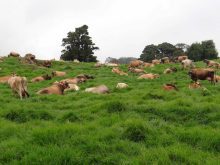It’s not a question of if, but when Stephen Harper’s majority Conservative government will kill the Canadian Wheat Board’s monopoly over western Canadian wheat and barley.
The Tories have promised since 2006 to abolish the CWB’s statutory single desk, but were stymied until winning 167 seats in the May 2 election, giving them a solid majority in Parliament.
Agriculture Minister Gerry Ritz says he will consult with farmers, but there won’t be a referendum.
“There’s going to be some changes coming, absolutely,” Ritz said. “But the board will remain.”
Read Also

Aster leafhoppers: An unwanted guest migrating from U.S. for canola
Research scientist talks about the prevalence of aster yellows in canola in Alberta, with testing on its pest carriers and conditions in which it affects yields.
The mood was sombre at the CWB’s Winnipeg headquarters following the election, said one of its 400 employees. “People were surprised and stunned at first, but they always knew it was a possibility,” said the employee who asked not to be named.
Managers met with staff to reassure them, said CWB chair Allen Oberg.
“There is no doubt (that with) any other structure besides the one that we currently have, our conclusion is that it would deliver less value back to farmers,” he said.
Swift demise
The board’s monopoly on the sale of Western Canadian wheat and barley destined for export or domestic human consumption dates back to 1943, but its demise may be swift.
An open market effective August 1 – the start of the new crop year – is doable, according to Blair Rutter, policy manager of the Western Canadian Wheat Growers Association.
“All that will change is they’ll have less grain to handle as soon as we move to a voluntary situation,” he said.
The key is for the government to continue to guarantee the CWB’s initial payments and borrowings until it is transformed into farmer-owned co-op or share company, Rutter said. The board has no assets so without guarantees it won’t be able to obtain financing to operate, he said.
Abolishing the CWB’s single desk marketing power is a top priority, Ritz said in an interview, but noted there’s lots the new government must do first, including the throne speech, a budget, and passing the government’s crime bills before the summer break.
One option is to revive Bill C-619, a Conservative private member’s bill to end the single desk introduced earlier this year, said David Anderson, parliamentary secretary for the CWB.
Only seller
The board and its supporters have long argued that being the only seller of the West’s non-feed wheat and barley allowed it to extract premiums in some markets. Because the CWB doesn’t own elevators or terminals it would have to rely on its competitors to handle its grain, Oberg said.
“I suppose if survival is the only criterion, yes, the CWB could survive (in an open market) … but it would be a far different animal than what farmers are used to today,” he said.
The Australian Wheat Board didn’t survive, despite owning facilities. Last week the Australian government approved the sale of its grain selling operations, owned by Agrium, to Cargill for an undisclosed amount.
The CWB simply can’t compete with companies who own supply pipelines, said Brian Oleson, head of the University of Manitoba’s department of agribusiness.
But Brenda Tjaden Lepp, chief analyst at Winnipeg-based Farm-Link Marketing Solutions, said the CWB has good relations with end-use customers. It could team up with independent grain companies and shippers if the big players try to shut it out.
More investment
An open market could benefit farmers by attracting more private investment to improve grain varieties, Ritz said.
“We’re not seeing new varieties of wheats, durums and barleys like we should because they don’t have the ability to market,” Ritz said.
George Morris Centre senior fellow Larry Martin said millers and maltsters would have more reason to build facilities in Western Canada if they could buy grain directly from farmers, rather than at higher rates through the CWB’s single desk.
Farmers should use the change in the CWB’s mandate as opportunity to form their own grain company either as a co-op or shareholder company, Rutter said.
“This can restore that sense of co-operation that has been lost in the last decade when the Pools and UGG (United Grain Growers) were transformed from co-ops,” he said. “View this as an opportunity to regain that which was lost.”
That wasn’t the view taken by Oberg, who said that since farmers control and pay for the CWB, they – not the government – should determine its mandate through a plebiscite. In March, Oberg said Ritz appeared to agree.
“Until farmers make that change, I’m not prepared to work arbitrarily,” Ritz said at a meeting in Manitoba. “They are absolutely right to believe in democracy. I do, too.”
The Keystone Agricultural Producers, Canadian Federation of Agriculture and National Farmers Union also say changes to the CWB’s mandate should be put to a farmer vote.
There are lots of details to work out such as how recipients of CWB funds such as the Canadian International Grains Institute (CIGI) and trade challenges, will be paid for in an open market. One approach is to create Canadian Wheat Council modeled after the Canola Council of Canada, Rutter said. The canola council collects a checkoff on canola to fund market development and extension.
The CWB, created in 1935 when voluntary pooling through the Prairie wheat pools collapsed due to plunging world wheat prices, is currently the world’s single largest wheat and barley exporter. Last crop year it earned $5.2 billion in gross revenue, with almost 89 per cent of it returned to farmers.
withfilesfromRodNickel,Reuters
———
“Isupposeifsurvivalis theonlycriterion,yes, theCWBcouldsurvive (inanopenmarket)… butitwouldbeafar differentanimalthan whatfarmersareusedto today.”
Allen Oberg














